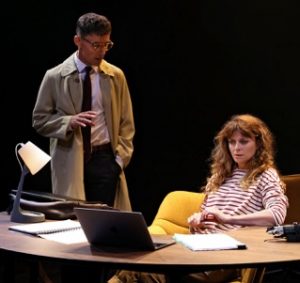By Melanie Tait. Sydney Festival 2023, at The Ensemble Theatre, Sydney. Directed by Janine Watson. 26 January – 4 March 2023
Reviewed : February 2, 2023*

Melanie Tait is a playwright who respects the intelligence and empathy of her audience. She ensures that her themes are relevant, thought provoking … as well as being entertaining. She knows her subjects, writes convincingly about them. She also respects her characters and the actors who will portray them. The characters have depth and layers of dimension that give their actors – and directors – much with which to work.
So cleverly written was her play The Appleton Ladies Potato Race that it has toured nationally, become the new ‘go to’ for many community theatre companies, and will soon be released as a film. A Broadcast Coup is equally clever, albeit just a little more confronting … for some.

Tait turns to her experience in the broadcast media for this play – and to the many stories about life in the ‘on air’, dog eat dog – Jock eat Jock? – competitive realm of radio. She sets the play in the studio of a national radio station. Makes it the morning show. You know the drill: a popular ‘host’; interviews on topical events; newsworthy guest spots; all put together by a quick-thinking, intelligent, well-organised production team.
Written in the wake of the international reaction to the Harvey Weinstein disclosures – and just into rehearsals as the 2020 lockdown hit – A Broadcast Coup explores in Tait’s own words “the grey areas of life after the 2017 #MeToo reckoning”. Questioned by a male friend about the relevance of the play after that “reckoning”, Tait writes “I would love A Broadcast Coup to be irrelevant …(but) … in December, yet another media star was sacked from his job in Sydney after harassing colleagues at a Christmas party” …

The relevance of the play remains – and this production by a very perspicacious director and an equally astute cast, finds the humour as well as well as the discomfort in the complex issues Tait raises
Firstly, Janine Watson leads her cast with insightful direction to realise the picture Tait paints of the broadcast studio. The pace and intensity of getting to air each day. The background work of the production team: topics, phone calls, time slots, background research, station IDs, ratings, meeting Board requirements, keeping to budget.
That frantic rush, every morning, each weekday is realised in tight, astute direction, made easier by Tait’s economic, realistic dialogue and the clever set designed by Veronique Benett and lit by Matt Cox. Two kidney shaped desks swivels constantly to suggest different locations – the studio, a bar, an apartment. A huge electronic weekly diary is the backdrop. Microphones descend to take the show to ‘air’ and two digital clocks pace each live interview. All occur in perfect synch with the pace Watson has set.

Sustaining that pace are five perceptive performers. There is long time host Mike played with calculating guile by Tony Cogin. It’s not easy playing a part it’s easy for the audience to dislike and judge, but Cogin does it well, breezing in from a week-long anger management course as if from a summer holiday, a bit brash, in charge, cocky – an arrogant sort of confidence that he falls back on whenever challenged.
Sharon Millerchip is his long-term, hard-working producer, Louise. Millerchip knows this character well – as do Tait and Watson. Loyal, stalwart, she is the backbone of the program, planning, the show, fielding complaints, keeping Mike’s diary in check, keeping Mike himself in check, even ensuring he has a clean shirt in case of an all-night ‘outing’.

Millerchip finds every subtlety written into this role. She is in every moment, reacting to every change in tone, every nuance in every word or action – at the same time becoming increasingly aware of the precipice on which the program hangs, including the vulnerability of the young production intern, Noa, played by Alex King.
King gives Noa the assurance of an intelligent, smart graduate. She knows her stuff, she’s keen, she wants to learn, especially from Mike because she’s admired him for years. Because Noa is ambitious and King makes this very clear in strong dialogue, precise movements and clear, adroit reactions.
Ben Gerrard plays Troy, whose job is to ensure everyone, especially Mike, meets all the requirements of ‘management’. It’s not an easy job, especially as Mike belittles him constantly, but Troy is determined, and Tait has made that relentlessness Troy’s real strength. Gerrard plays to it cunningly, giving his Troy the dogged belief that right will eventually win, and using his excellent comedic timing to add levity to the role..
The “fly’ in the carefully mixed elements of the plot, played by Amber McMahon, is feminist activist Jez, whose podcasts on women’s issues have become increasingly popular and hard hitting. All are based on very solid research, including a series of interviews she has collected from other women who, like Jez herself, once worked on the program.

McMahon plays a Jez who is self-assured, persuasive, who doesn’t suffer fools gladly. She plans carefully, knows when to strike and how to do it most effectively. But until she goes to air with her latest podcast, she’d like Louise to come on board – for a particular reason ….
Put these five characters together in a rising media maelstrom deftly contrived by a clever writer, and you have a work where Janine Watson felt she “needed to pay great attention to time, pace, rhythm, both in the physical and verbal language elements”.
A play indeed where she felt her main task was “to create a sense of immediacy so you, in the audience, might feel like active participants in the seeking of an answer to the questions it asks. Where you feel included in the story and its unfolding.” “What’s the point of being a spectator”, she asks, “if we can’t see ourselves in their story?”
She leaves it up to you, you see, to bear your own witness – based of course on how you react to the events, how you identify with the characters – and how valid you feel Tait’s message to be. And that’s the kind of direction this play requires.
*Opening night